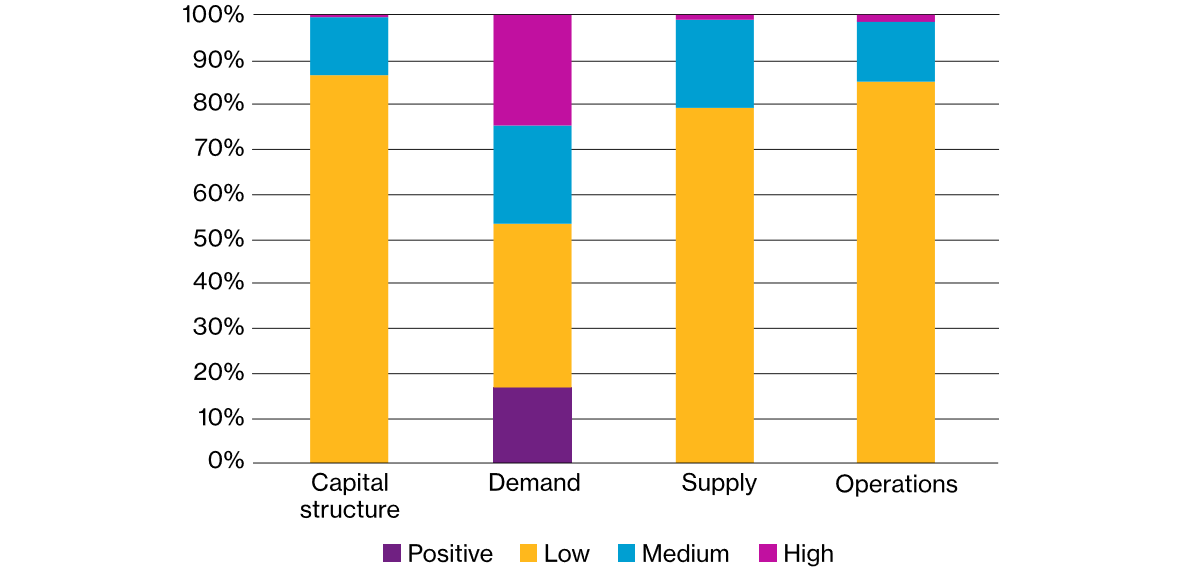ARLINGTON, VA, July 8, 2020 – Private equity investments appear to be weathering the impact of the pandemic across multiple sectors and geographies, according to the results of a Private Equity and COVID-19 study by Willis Towers Watson (NASDAQ: WLTW), indicating that despite a subdued environment for exit deals in the first six months of the year, there has been little evidence of forced exits. The survey, which took place in April across 36 private equity funds representing 300-plus portfolio companies, was designed to better understand how businesses were coping due to the pandemic as well as setting out expectations for the coming months.
The results revealed the significant turmoil in capital markets has had little effect on the capital structures of portfolio companies, with 87% of respondents saying their holdings were unlikely to breach covenants as a result. Only 13% said holdings were either close to breaching or likely to breach covenants in the next two to three months.
“Private equity-owned companies have a number of structural advantages that may have allowed them to navigate this crisis,” said Jon Pliner, U.S. head of Delegated Portfolio Management. “In addition to the expertise provided by private equity managers, the additional access to equity and debt capital from their sponsors may also have provided some respite.”

Regarding customer demand for products or services, however, responses were far more varied with 46% of respondents reporting their holdings were feeling a medium-to-high impact from the slowdown in global economies, mostly within the consumer discretionary, industrials, energy and materials sectors. In contrast, sentiment among commercial services firms remained robust, while 20% of consumer staples firms even reported a positive impact on demand.
The impact on businesses’ supply chains and their own internal operations also remained small, with around 80% of respondents showing low levels of concern on either point, indicating most private equity-held businesses effectively implemented alternative working arrangements to work around any disruptions arising from the COVID-19 crisis.
“While the first half of the year has seen a subdued environment for exit deals, managers have been able to maintain significant flexibility over both the timing and the terms of company exits. As a result, we have seen little evidence of forced exits by private equity firms into a depressed market,” said Pliner. “Beyond the short-term dislocation, we also see several opportunities where we can continue to deploy capital, notably in technology, healthcare and consumer staples. With deal volumes depressed, there appears to be far less competition for opportunities and, as a result, potentially better entry pricing.”
The information included in this presentation is intended for general educational purposes only and does not take into consideration individual circumstances. Such information should not be relied upon without further review with your Willis Towers Watson consultant. The views expressed herein are as of the date given. Material developments may occur subsequent to this presentation rendering it incomplete and inaccurate. Willis Towers Watson assumes no obligation to advise you of any such developments or to update the presentation to reflect such developments. The information included in this presentation is not based on the particular investment situation or requirements of any specific trust, plan, fiduciary, plan participant or beneficiary, endowment, or any other fund; any examples or illustrations used in this presentation are hypothetical. As such, this presentation should not be relied upon for investment or other financial decisions, and no such decisions should be taken on the basis of its contents without seeking specific advice. Willis Towers Watson does not intend for anything in this presentation to constitute “investment advice” within the meaning of 29 C.F.R. § 2510.3-21 to any employee benefit plan subject to the Employee Retirement Income Security Act and/or section 4975 of the Internal Revenue Code.
Willis Towers Watson is not a law, accounting or tax firm and this presentation should not be construed as the provision of legal, accounting or tax services or advice. Some of the information included in this presentation might involve the application of law; accordingly, we strongly recommend that audience members consult with their legal counsel and other professional advisors as appropriate to ensure that they are properly advised concerning such matters. In preparing this material we have relied upon data supplied to us by third parties. While reasonable care has been taken to gauge the reliability of this data, we provide no guarantee as to the accuracy or completeness of this data and Willis Towers Watson and its affiliates and their respective directors, officers and employees accept no responsibility and will not be liable for any errors or misrepresentations in the data made by any third party.
In the absence of its express written permission to the contrary, Willis Towers Watson and its affiliates and their respective directors, officers and employees accept no responsibility and will not be liable for any consequences howsoever arising from any use of or reliance on the contents of this document including any opinions expressed herein.
Views expressed by other Willis Towers Watson consultants or affiliates may differ from the information presented herein. Actual recommendations, investments or investment decisions made by Willis Towers Watson and its affiliates, whether for its own account or on behalf of others, may not necessarily reflect the views expressed herein. Investment decisions should always be made based on an investor’s specific financial needs.
Willis Towers Watson (NASDAQ: WLTW) is a leading global advisory, broking and solutions company that helps clients around the world turn risk into a path for growth. With roots dating to 1828, Willis Towers Watson has 45,000 employees serving more than 140 countries and markets. We design and deliver solutions that manage risk, optimize benefits, cultivate talent, and expand the power of capital to protect and strengthen institutions and individuals. Our unique perspective allows us to see the critical intersections between talent, assets and ideas — the dynamic formula that drives business performance. Together, we unlock potential.